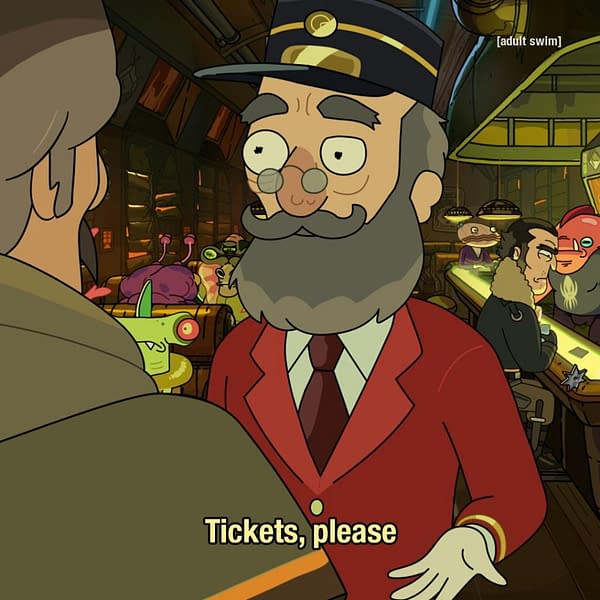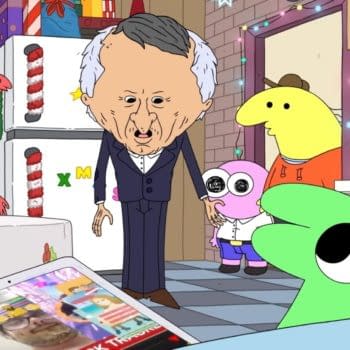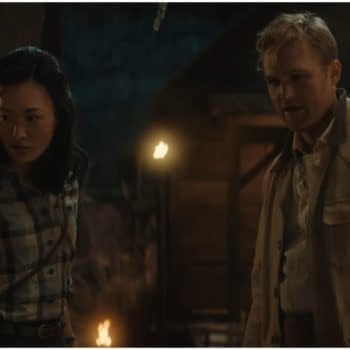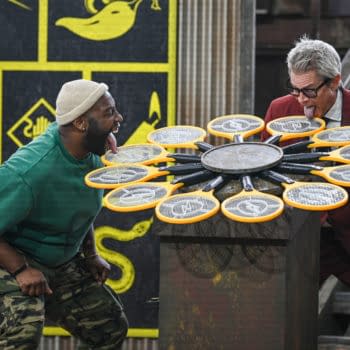Posted in: Adult Swim, Cartoon Network, Review, Rick and Morty, streaming, Trailer, TV | Tagged: Adult Swim, animation, Beth, cartoon, dan harmon, episode 6, Jerry, Justin Roiland, morty, Never Ricking Morty, Review, rick, rick and morty, season 4, summer
Rick and Morty Season 4 Never Ricking Morty Review: Meta Primal Scream
We're going to let you have this episode of Rick and Morty, Dan Harmon and Justin Roiland. Let me be clear: that is in no way meant to diminish director Erica Hayes and writer Jeff Loveness because this was a true mindf**k that found ways to create walls just to break them. But "Never Ricking Morty" came across as a kind of creative primal scream from the series creator's souls, a need for the creative forces behind the scenes to make sure we understand just how hard this thing we call Rick and Morty can be and how it might be driving them mad. Now, if you just read that and you're making a face I more than understand.

In anyone else's hands and at any other time, a concept like the one in the midseason return would easily become an exercise in pretentious self-pity and self-aggrandizing. Hayes and Loveness layer the message with less-discussed but just as biting commentary on a number of topics that kept our brains busy keeping a number of plates spinning at the same time. Having this episode running at a time when most of us find ourselves still social distancing and in-home lockdown also helped its cause, because who doesn't feel like screaming into the void that no one understands how hard they're having it? Throw in some quality "fan service" scenes that have the beauty of being both gratuitous and necessary and Jesus saving the day, and what you end up with is a welcome return (now get back on the train).
Here's a Look at Some of Our Rick and Morty Takeaways
It was nice to see the series continue it's season-long Kill Bill-like hit list of themes and genres it doesn't like with anthologies. Having different story themes populate different train cars was a nice touch, but I definitely agree on the pointlessness of the "story-telling" device almost as much as I scratch my head at prequels. What's the point? In the former, more often than not they don't matter "big picture"; and in the latter, you pretty much already know where everything's going. For the show's creator's, the train's ouroboros route is about as in-your-face with its symbolism as anything could be, short of having a container labeled "Continuity" explode (but just in case): the biggest "big bad" that could ever doom Rick and Morty is to become "same old, same old", so tied to its past and its success that it becomes either too comfortable or too afraid to still be different.
I'm curious to see how social media responds to the episode's take on the Bechdel test. Created by illustrator Alison Bechdel in the mid-80s, it's a way to judge a work to see if it portrays women in a sexist way or engages in gender stereotyping. To pass the standard, a work must feature at least two women, these women must talk to each other, and their conversation must concern something other than a man. Our dimension-hopping duo opts to take the test to save Morty from certain death, though having Summer and Beth battling a swarm of alien lady scorpions by using their "heavy special time" (yup, their periods) to shoot lasers out of their vaginas. I loved that scene and respect Loveness' decision to go the self-deprecating route to show how clueless some male writers are when it comes to writing exchanges between women that actually address their issues.
Is it too much of a leap to say Story Lord comes across as the "Harmon" in this episode? Because that's what I took away from it, with the "cum-gutter" body (learned that this episode) an exaggeration of all the working out he's been doing and tracking on social media. My theory gets stronger as Story Lord begins draining Rick and Morty of their narrative energy to break the fifth wall, bleeding away potential future storylines that teased the returns of faces we're now not sure we'll ever see. Abradolph Linkler, Tammy, Snowball, PhoenixBirdPerson, and of course the ultimate end-scene of Evil Morty having marshaled his forces for one final blow against the two. In fact, so much that fans have been wanting to see is offered here and throughout; and that's also the problem: these are the narrative expectations that can stifle the series' ability to be different. This is why bringing in Jesus was a masterstroke in that it was the ultimate way for Rick and Morty to not be Rick and Morty: having Rick do something no one would've ever expected. Guess what? That's okay. And those ready to be insulted by Jesus being in the episode? He gets to be the good guy, so be happy.
Let's take a look at some quick hits, beginning with Loveness' interesting fear/fascination with older men being really ripped and looking to kick ass. Paul Giamatti as the almost Terminator-like train conductor (by half), Christopher Meloni as The Flowing Hair Dude, and an animated Ruth Bader Ginsburg were welcome guest appearances this round. For an episode that hates anthologies, it does feel like they found a way slip in an "interdimensional cable" and "mind-blowers" ep through the backdoor while we were distracted with the deep, meaningful meta stuff. As for the ending message about "buying" and "capitalism", I'm hoping that was included as ten-tons of irony considering the night was sponsored by Postmates, Wendy's, and Pringles.










